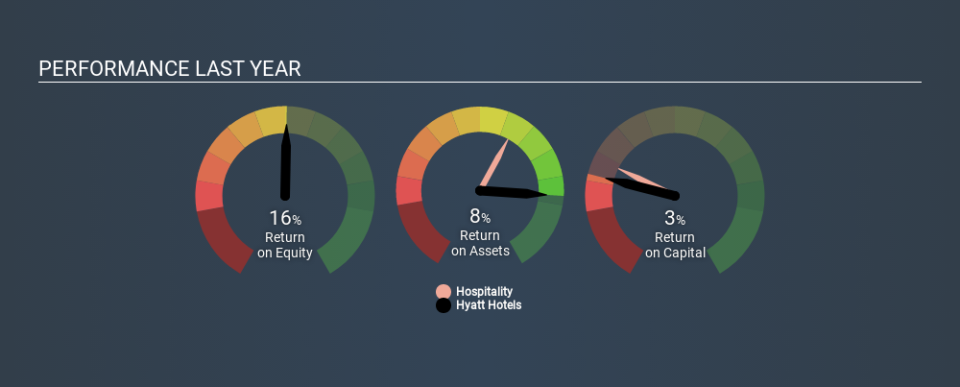How Do Hyatt Hotels Corporation’s (NYSE:H) Returns On Capital Compare To Peers?

Today we'll evaluate Hyatt Hotels Corporation (NYSE:H) to determine whether it could have potential as an investment idea. In particular, we'll consider its Return On Capital Employed (ROCE), as that can give us insight into how profitably the company is able to employ capital in its business.
First up, we'll look at what ROCE is and how we calculate it. Next, we'll compare it to others in its industry. And finally, we'll look at how its current liabilities are impacting its ROCE.
Understanding Return On Capital Employed (ROCE)
ROCE is a measure of a company's yearly pre-tax profit (its return), relative to the capital employed in the business. All else being equal, a better business will have a higher ROCE. Ultimately, it is a useful but imperfect metric. Renowned investment researcher Michael Mauboussin has suggested that a high ROCE can indicate that 'one dollar invested in the company generates value of more than one dollar'.
So, How Do We Calculate ROCE?
The formula for calculating the return on capital employed is:
Return on Capital Employed = Earnings Before Interest and Tax (EBIT) ÷ (Total Assets - Current Liabilities)
Or for Hyatt Hotels:
0.029 = US$208m ÷ (US$8.3b - US$1.2b) (Based on the trailing twelve months to March 2020.)
So, Hyatt Hotels has an ROCE of 2.9%.
View our latest analysis for Hyatt Hotels
Does Hyatt Hotels Have A Good ROCE?
One way to assess ROCE is to compare similar companies. Using our data, Hyatt Hotels's ROCE appears to be significantly below the 8.1% average in the Hospitality industry. This performance could be negative if sustained, as it suggests the business may underperform its industry. Regardless of how Hyatt Hotels stacks up against its industry, its ROCE in absolute terms is quite low (especially compared to a bank account). Readers may wish to look for more rewarding investments.
We can see that, Hyatt Hotels currently has an ROCE of 2.9%, less than the 4.3% it reported 3 years ago. So investors might consider if it has had issues recently. You can see in the image below how Hyatt Hotels's ROCE compares to its industry. Click to see more on past growth.
Remember that this metric is backwards looking - it shows what has happened in the past, and does not accurately predict the future. ROCE can be misleading for companies in cyclical industries, with returns looking impressive during the boom times, but very weak during the busts. This is because ROCE only looks at one year, instead of considering returns across a whole cycle. What happens in the future is pretty important for investors, so we have prepared a free report on analyst forecasts for Hyatt Hotels.
Do Hyatt Hotels's Current Liabilities Skew Its ROCE?
Current liabilities are short term bills and invoices that need to be paid in 12 months or less. Due to the way the ROCE equation works, having large bills due in the near term can make it look as though a company has less capital employed, and thus a higher ROCE than usual. To counter this, investors can check if a company has high current liabilities relative to total assets.
Hyatt Hotels has total assets of US$8.3b and current liabilities of US$1.2b. As a result, its current liabilities are equal to approximately 14% of its total assets. This is a modest level of current liabilities, which will have a limited impact on the ROCE.
What We Can Learn From Hyatt Hotels's ROCE
Hyatt Hotels has a poor ROCE, and there may be better investment prospects out there. You might be able to find a better investment than Hyatt Hotels. If you want a selection of possible winners, check out this free list of interesting companies that trade on a P/E below 20 (but have proven they can grow earnings).
I will like Hyatt Hotels better if I see some big insider buys. While we wait, check out this free list of growing companies with considerable, recent, insider buying.
Love or hate this article? Concerned about the content? Get in touch with us directly. Alternatively, email editorial-team@simplywallst.com.
This article by Simply Wall St is general in nature. It does not constitute a recommendation to buy or sell any stock, and does not take account of your objectives, or your financial situation. We aim to bring you long-term focused analysis driven by fundamental data. Note that our analysis may not factor in the latest price-sensitive company announcements or qualitative material. Simply Wall St has no position in any stocks mentioned. Thank you for reading.

 Yahoo Finance
Yahoo Finance 
